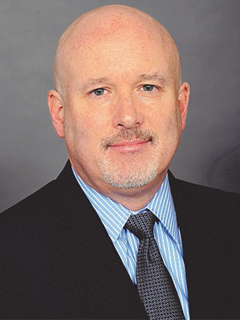Transcript continued
Joining me today is my colleague Glen Collins, who is the senior manager also with our Global Mobility Services Practice based in Washington, D.C. Hi, Glen, nice being with you today. Let’s get started and jump right in. So Glen, can you first talk a little bit about the GAPP survey itself, so we can provide a brief overview of the survey for our listeners?
Glen: Oh, sure, I’d be happy to, Katherine, and good morning. So first, to set a baseline for global mobility leaders of multinational organizations, KPMG has found that benchmarking their global mobility policies and their practices against those of other global organizations and industry peers can really be a powerful tool for reflecting on an organization’s current approach and planning how to prepare their talent mobility program for the future.
So to help in this endeavor, KPMG International conducts an ongoing annual survey of global mobility policies and practices of multinational organizations. And while the number of participants continues to grow, the resulting database is already believed to be one of the most robust of its kind on a global scale. We now have input from over 375 multinational organizations in more than 25 countries and/or territories. And the survey data offers insights into global mobility programs and how they are evolving in terms of mobility tax, immigration policies, program structure, governance, key priorities, overall performance managers, using technology automation and much more. So we’re very proud of the structure of the survey itself and as I mentioned, it does continue to grow based upon our own client feedback.
A nice feature is that the survey is free and it’s open year round for participation. And participants can download a report and compare their results to other survey participants. Katherine, I should mention that the survey can be accessed at KPMG.com\GAPPsurvey all one word.
Katherine: Great. Thanks for the overview, Glen. So, based on the results of this year’s survey, can you share some of the key trends that global mobility leaders are telling us?
Glen: Sure. Well, a key focus on global tax and immigration compliance is at the forefront of nearly every client program that KPMG supports. Like GAPP survey participants also noted in 2022 that in addition to managing global risks and ensuring corporate and employee compliance, first support their organization’s business objectives, followed by controlling program costs and finally being adaptable to changing business requirements are clearly the top say three priorities for today’s global mobility leaders. Frankly, we’ve also seen the same being quite consistent over the last five years or so. Also, we’re seeing global mobility department’s contribution to providing strategic value now seems to be taking a priority over cost minimization in many areas which was much more prevalent in the past. And also with so many global organizations placing a business priority in recruiting, engaging, developing and retaining talent.
KPMG is also seeing overarching diversity, equity and inclusion initiatives being aligned and integrated with global talent mobility policy and the associated provisions and services. And we’re also seeing a similar integration of environmental, social and governance, or ESG factors into global mobility policies themselves, in particular with regards to an organization’s environmental sustainability initiatives, which is quite exciting.
But Katherine, from our experience, I’m sure that you would agree that developing a mobility policy framework that aligns policies to assignment type or purpose and the overarching talent management framework is … is very important now for global organizations. It’s critical to have the right policy framework to manage from and to ensure desired talent goals and business outcomes.
Katherine: Yeah, absolutely, Glen, I fully agree with you. I should also note that we are definitely seeing a continuing focus by organizations on employee experience, my personal favorite topic. When companies are operationalizing global mobility policies, we’ve seen that changing workforce demographics are resulting in millennials and GenZ employees desiring more flexibility in determining relocation and assignment support that best meets their personal needs. They’re looking for more choice.
And along those lines, and as also noted in our GAPP survey findings, core versus flex, cafeteria menu and points based policy provisions and services approach are the most commonly adopted policy trend and approach by 65 percent of GAPP survey participants. So, Glen, maybe you can talk a little bit about some of the other findings from this year’s GAPP survey that we’re seeing.
Glen: Sure, Katherine, I’d be happy to. So, we’ve definitely highlighted the continuing focus on employee experience as you mentioned, and flexibility and policy approach. In addition, a few other standout areas this year included first, the critical integration between global talent mobility and the talent management functions. It’s definitely gaining momentum, which is a very positive thing. Organizations continue to adopt more purposeful approaches to mobilizing talent mobility. By strengthening these connections and collaboration between the two functional areas, specifically 71 percent of survey participants ranked supporting overall business and talent development objectives as a top program goal.
Secondly, technology continues to lead the way. As we know, global talent mobility is too complex and important to the business and employees just to leave up to chance. Aside from a desire for increased automation around key administrative and compliance based actions, KPMG is also noting that organizations are now seeking fully integrated what we call, quote, single source of data truth, unquote, technology solutions. And this also involves integration with external service providers. Employee self-service options and processes integrated with mobile technology solutions is certainly on the rise as well.
And then thirdly, organization are focusing more on the overall talent experience versus administration and transactions. So, as such, outsourcing high volume complex transactions like individual tax and immigration compliance, as well as the logistical relocation coordination and support to mobile employees continues to be a leading approach for talent mobility service delivery models. This then enables global mobility teams to focus on providing superb employee experiences.
So Katherine, what we’re calling this is the new reality. What do you expect to be the biggest changes between traditional approaches to managing global talent mobility and going forward in the future for organizations?
Katherine: Yes, great question, Glen. So from a pure policy perspective, this year’s GAPP survey results have confirmed that over the last two years, the most commonly used type of formal international assignment policies include the long term or standard, for example one to five years kind of maximum. And also, permanent indefinite length international transfers, so definitely a leading policy approach over the last ten years. And that’s followed by the short term and project based and commuter assignments. And a continuing trend of increased diversity in the types of mobility policies, we continue to see that in the market, with half of GAPP survey participants predicting an increase in short term and commuter assignments and permanent transfers. And close to half report a decrease in long term or standard assignments over the next five years.
Glen: Katherine, before we close today, what about the remote work experiment that was accelerated by so many organizations globally as a result of the global pandemic. What are we seeing now and any predictions for the future?
Katherine: Definitely, Glen, remote work is a very hot topic. From our experience in working with our clients over the last two plus years, many workers, especially those in professional services still favor working remotely at least part of the time, which is very similar, by the way, to KPMG’s own, what we call Flex with Purpose approach in which many of us at KPMG are now spending a few days working in the office, a couple days working from home or remotely, so the typical hybrid approach.
However, it’s interesting to see really Glen that, as cited in KPMG’s Global CEO Outlook survey, it appears that CEOs are changing how they support and attract talent. And their efforts are being buoyed by a focus on their people and are continuing to experiment with ways of working. In the long term, the employee value proposition to attract and retain necessary talent is tied as the top operational priority to achieving three year growth objectives.
So, Glen, it’s just so interesting to note that while providing options for remote working has clearly had a positive impact on hiring, collaboration and productivity over the past two years. Sixty-five of CEOs see in office as the preferred work environment over the next three years. So, the remote work experiment certainly continued into 2022, and for many organizations will continue. The approach may be a bit more selective and depending on talent and business priorities.
Glen: Thank you for those insights, Katherine. So I think we can anticipate a continuing intersection of so many of the topics that we discussed today influencing global talent mobility and the future of work. This is probably a good place for us to wrap up our discussion today. In future episodes, we’ll continue to address the top of mind issues of interest to our listeners. In the meantime, we’d love to hear from you. If you have thoughts on today’s podcast episode or ideas for future episodes please send us an email at US-taxwatch@KPMG.com. One final thanks to our audience for listening in. Thank you.



